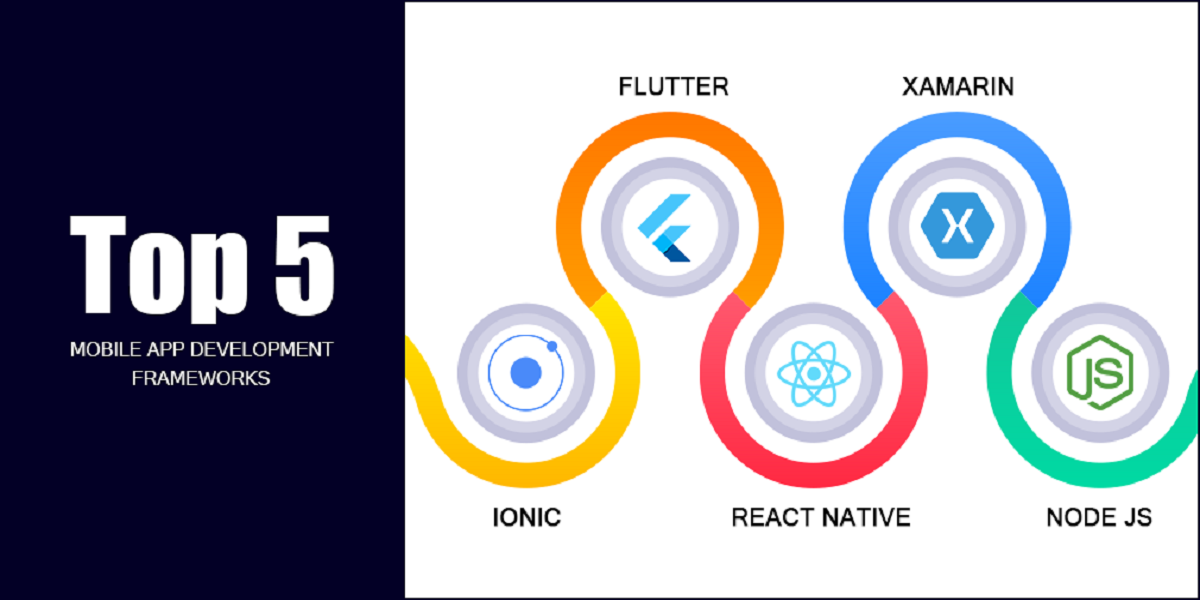
There is no surprise that mobile apps are booming these days when it comes to driving customers, exposing brands, and acquiring scalable results. From every startup to mid-sized to the large scale of business units are ensuring their dependency on mobile apps to generate improved revenue. But have you ever peeped into the mobile app development background? For instance, what actual frameworks, tools, and methodologies are used while developing mobile apps?
Since market penetration is not easy if your app is not designed and developed while keeping the success factors in mind, your app may be abandoned by the market after a rare use. Hence, you must be vigilant about the bottom line of your mobile app development, for instance, the development platform, development methodology, quality assurance level, and other digital transformation tactics. In this blog, we are going to unfold the top frameworks to develop iOS and Android apps in this modern age:
Ionic
Ionic is one of the renowned open-source mobile app development frameworks which is based on AngularJS and used to develop cross-platform independent apps. It enables developers to develop rich-featured and intuitive navigational mobile apps using HTML, CSS, JavaScript, and Cordova to bring native-feel like experience.
Apps built using the Ionic framework allows mobile app developers to craft an impeccably creative user interface with highly bonzer and user-loving navigation. With this framework, the code can be developed once and can be used for both the Android and iOS devices. Hence, it can be a proven budget-friendly deal for startups, small businesses, or enterprises willing to test the market first before launching a major project in terms of the mobile app.
Flutter
Flutter is a product of Google to develop and deploy engaging UI and highly-enriched mobile apps to seamlessly integrate with other third-party tools and run on cross-platforms leveraging the single code efficiency. It enables developers to create such a powerful interface that allows effectively support and dynamically run on the latest versions of both the Android and iOS devices.
Flutter can be a proven choice for the startups or enterprises seeking to release their MVP first before coming up with a whole structure as various companies believe to launch their MVP first to test the market potentials so as can customize and implement the analyzed functionality to ensure app success. Deploying apps using Flutter could also be a cost-effective approach.
React Native
When it comes to the React Native mobile app development framework, as the name suggests, it gives native-like experience to the users and supports both the Android and iOS devices to capture the entire crowd with a single code. This framework can be a worthy choice for those companies willing to develop a graphic intense app.
React Native involves the facilitation of JavaScript as it built on JavaScript itself. It allows developers to write code or build apps utilizing Swift, Objective C, and Java and leverage the native efficiency to render native efficiency wherein users can seamlessly amuse the native-like experience whether using Android devices or iOS devices.
Xamarin
Xamarin is another name that comes in this list. This mobile app development framework is quite different from others as it allows developers to deploy a native look and feel whether for Android Apps or iOS apps. Moreover, this framework allows developers to leverage c# and .Net languages to deliver user-reinforcing experience.
With Xamarin, you can create a cross-platform experience for your users while ensuring cost-effectiveness as it allows you to effectively roll-out your app on every device and to increase your outreach with the maximum number of users. This mobile app development framework eliminates the issues of hardware compatibility as this enables the mobile app development company to integrate with third-party plugins and APIs efficaciously.
NodeJS
NodeJS is an open-source JavaScript run-time framework suggested by today’s industry experts as this cross-platform framework allows coding maniacs to build and render highly responsive and pretty-sleek interface design with sturdy functional navigation. This app development platform is enriched with a multitude of JavaScript modules helping the development team to develop the customer-engaging and productivity-driven app that may reinforce businesses to elevate anticipated results.
With NodeJS, you get secured and reliable code that runs smoothly and in a quite speedy way whether you run on Android devices or iOS devices. To know more, you can always avail of the counseling from one of the cutting edge mobile app development firms.
Wrapping Up
Thus, if you are planning for your app goals, above mentioned facts will truly work as a milestone prior to outsourcing mobile app development company. Considering your basic requirements, you can make an improved decision while making a choice among the mobile app building platforms out there. Through this, you can eternally reserve a success part for your app in today’s extremely competitive marketplace.
